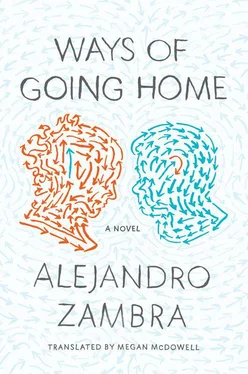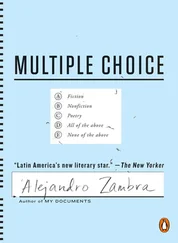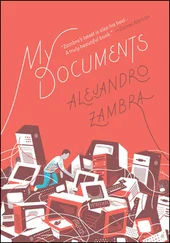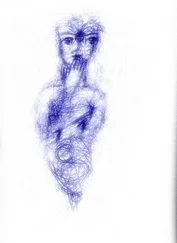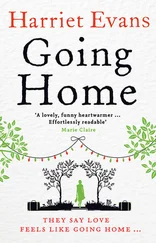“But you will finish it and it’ll be good.”
I wanted to ask for more details, about some passages in particular, about certain characters, but it wasn’t possible because one of the women from the corner table came over and greeted Eme effusively. “I’m Pepi,” she said, and they hugged. I don’t know if she said Pepi or Pepa or Pupo or Papo, but it was some nickname like that. She introduced us to her children, who were the loudest of the group. Eme could have cut the conversation off there, but she chose to keep on talking with her old classmate about what a huge coincidence it was to run into each other at that restaurant. It didn’t seem like such a big coincidence to me. Pepi or Pupi or Papi lives in La Reina just like Eme. The strange thing is that they hadn’t run into each other sooner.
I felt bad. I thought Eme was drawing out the conversation on purpose. That she was grateful for that encounter because it let her put off the moment when she would have to give me a real opinion about the manuscript. Then she said she was sorry and she had to go. I went home frustrated, angry. I tried to go on writing, but I couldn’t.
* * *
When I was a child I liked the word blackout . My mother would come get us and bring us into the living room. “In the past, people didn’t have electricity,” she would say as she lit the candles. It was hard for me to imagine a world without lamps, without outlets in the walls.
Those nights, they let us stay up talking for a while and my mother used to tell the joke about the candle that couldn’t be extinguished. It was long and boring, but we liked it a lot: the family tried to put out a candle so they could go to bed but they all had crooked mouths. Finally the grandmother, who also had a crooked mouth, put out the candle by wetting her fingers with saliva.
My father laughed at the joke, too. They were there so we wouldn’t feel afraid. But we weren’t afraid. They were the ones who were afraid.
That’s what I want to talk about. Those kinds of memories.
* * *
Today my friend Pablo called me so he could read me this phrase he found in a book by Tim O’Brien: “What sticks to memory, often, are those odd little fragments that have no beginning and no end.” I kept thinking about that and stayed awake all night. It’s true. We remember the sounds of the images. And sometimes, when we write, we wash everything clean, as if by doing so we could advance toward something. We ought to simply describe those sounds, those stains on memory. That arbitrary selection, nothing more. That’s why we lie so much, in the end. That’s why a book is always the opposite of another immense and strange book. An illegible and genuine book that we translate treacherously, that we betray with our habit of passable prose.
I think about the beautiful beginning of Family Sayings , Natalia Ginzburg’s novel: “The places, events, and people in this book are all real. I have invented nothing. Every time that I have found myself inventing something in accordance with my old habits as a novelist, I have felt impelled at once to destroy everything thus invented.”
* * *
I’m in Las Cruces, enjoying the empty beach, with Eme.
In the morning, stretched out in the sand, I read Promise at Dawn , the book by Romain Gary where this precise, opportune paragraph appears: “I don’t know how to speak of the sea. I only know that it frees me for the moment from all my burdens. Every time I look at it I become a happy drowned man.”
I don’t know how to speak of the sea either, although it was presumably the first landscape I saw. When I was barely two months old my father took a job in Valparaíso and we went to live on Cerro Alegre for three years. But my first memory of the sea is much later, at perhaps six years old, when we were already living in Maipú. I remember thinking, awestruck and happy, that it was a limitless space, that the sea was a place that continued, that kept on going.
I’ve just tried to write a poem called “The Happy Drowned.” It didn’t work out.
* * *
We returned in a car Eme borrowed. I drove so carefully that I think she started to get desperate. Then I went with her, for the first time, to her house. I was struck by seeing her things dispersed in new ways. Recognizable. I don’t know if I liked sleeping there with her. I spent the whole time overwhelmed by the need to take in every detail.
In the morning we had tea with her friends. It was just as Eme had described it to me. The house is really an immense workshop. While Eme draws, her housemates — she has used their names many times but I can never remember them — make clothes and handicrafts.
When I was about to leave Eme asked me if I was writing. I didn’t know how to answer.
In any case, last night I wrote these lines:
It’s better not to be in any book
for the words not to try to protect us
A life with no music and no lyrics
and a sky without the clouds you see there now
* * *
My prose turns out odd. I can’t find the humor, the frame of mind. But I come up with some iambic lines and suddenly I let that rhythm take over. I move the lines, reinforce and break the cadence. I spend hours working on the poem. I read, out loud:
It’s better not to be in any book
for the words not to try to protect us
A life with no music and no lyrics
and a sky without the clouds you see there now
The clouds — you hardly know if they are coming
closer or retreating when they alter
their shapes so often and you’d hardly know
we weren’t still living in the place we left behind
before we understood even the names
of the trees
before we understood even the names
of the birds
When fear was only fear and there was no
love of fear
or fear of fear
and pain was an interminable book
that we once looked through quickly just in case
our names might be there in it at the end
* * *
I dreamed that I was drunk and I was dancing to a song by Los Ángeles Negros, “The Train to Forgetting.” Suddenly Alejandra Costamagna appeared. “You’re really wasted,” she was saying, “I’d better take you home, give me your address.” But I had forgotten my address and I kept dancing while I tried to remember it. In the dream I was drinking pisco and Coke; in the dream I liked pisco and Coke.
Alejandra was dancing with me but it was more like her way of helping me. I stumbled around outrageously, I almost fell down in the middle of the dance floor. But it wasn’t the dance floor of a club; it was someone’s living room.
“We aren’t friends,” I said to Alejandra in the dream. “Why are you helping me if we aren’t friends?”
“Because we are friends,” she answered. “You’re dreaming and in the dream you think we aren’t friends. But we are friends. Try to wake up,” she said. I tried, but I stayed in the dream and I started to get anxious.
Finally I woke up. Eme was sleeping next to me. I called Alejandra, told her about the dream. She laughed. “I like that song,” she said.
She asked how things were going with Eme. “I don’t know,” I answered instinctively. And it’s true, I think now: I don’t know.
* * *
There is pain but also happiness when you give up on a book. It’s felt that way to me, at least: first there’s the melodrama of having wasted so many nights on a useless passion. But then, as the days pass, a slight, favorable wind prevails. We start to feel comfortable again in that room where we write without any greater purpose, with no precise goal.
Читать дальше
